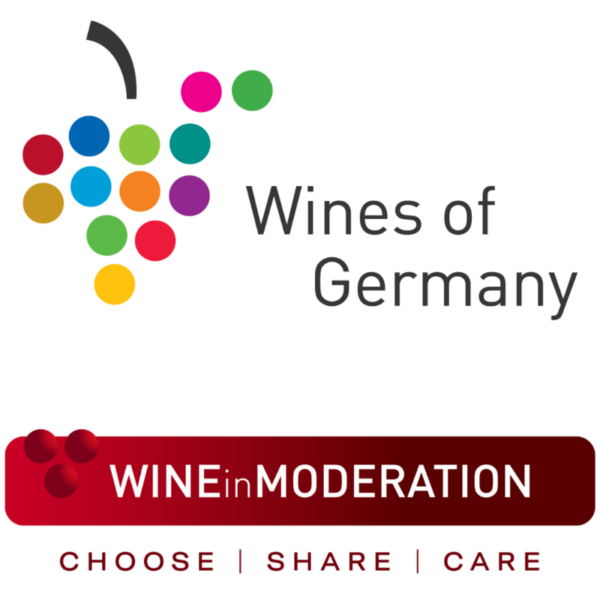Every month, ‘Whose Wine is it Anyway?’ profiles a German winemaker to give you a behind-the-vines look at the world of German wine. This month we’re focusing on the winemakers behind Weingut Kruger-Rumpf, Stefan Rumpf and his sons Philipp and Georg. From Germany’s Nahe region, Kruger-Rumpf exemplifies the innovative spirit reshaping the German wine industry. The family’s winemaking philosophy balances continuous experimentation with traditional winemaking methods, resulting in world-class wines that reflect each site’s distinct terroir.
Whose *Wine* is it Anyway? Meet Weingut Kruger-Rumpf
Meet Stefan, Philipp and Georg Rumpf
Estate: Weingut Kruger-Rumpf
Region: The Nahe (89%) and Rheinhessen (11%)
Village: Münster-Sarmsheim
Focus: Riesling
Background
The Rumpf family has managed the estate since the 1790’s, and the construction of the current winery began around sixty years later. In 1870, Karl Rumpf married Babette Kruger, a vintner’s daughter, and the winery was renamed Weingut Karl Kruger Erben, becoming the then largest winery in the region.
Over the years, however, the estate shrunk in size. The family winery was on the brink of bankruptcy when Stefan Rumpf took over in 1983. After studying agricultural science, Stefan felt confident in his ability to change the course of the winery. While the family had historically sold their grapes to other winemakers or cooperatives, Stefan decided to keep the majority of the 1984 harvest to produce their own estate wines. In order to promote interest in their local wines, Cornelia Rumpf, Stefan’s wife, opened a seasonal wine tavern on the estate’s premises.
In a short period of time, Cornelia’s business earned recognition on a cross-regional scale, while Kruger-Rumpf’s wines gained more and more notoriety. The couple’s joint efforts lead the way in placing the Nahe back on the international winemaking map, and they began exporting their wines to the U.S. in 1990. In 1992, Kruger-Rumpf became a member of the VDP (Verband Deutscher Prädikatsweingüter), an organization dedicated to promoting the Germany’s top wines and estates.
Stefan and Cornelia’s unwavering dedication and innovative mindset have been amplified by the couple’s sons, Philipp and Georg, who now manage the family business. Georg studied viticulture at the prestigious Geisenheim University and now manages the cellar and vineyards, while Philipp, who studied wine economics at Geisenheim, is responsible for sales and marketing.
Vineyards
Located in Münster-Sarmsheim, the Kruger-Rumpf 43-hectare estate is in the northernmost section of the Nahe region, paradoxically the warmest area around. At the intersection of four major German wine regions, the Kruger-Rumpf vineyards cover prime winemaking slopes in the Nahe, with the Rheingau and Mittelrhein to the north and the Rheinhessen to the east. In fact, 11% of the estate’s vineyards are across the Nahe River in Binger Scharlachberg, which is part of Rheinhessen.
Wines
Kruger-Rumpf cultivates white wine vines in almost 90% of their steep vineyards in the Nahe. Their specialty is Riesling, which makes up about 70% of the white wine vineyard area. Many of their vineyards are designated as “Grosse Gewächs” sites, which represent the highest level in quality according to the VDP classification. The wines from these sites reflect the Nahe’s personality, a combination of power and finesse and a distinct mineral taste. Kruger-Rumpf wines distinguish themselves through their structure, embodiment of quality, and clarity in style.
“When you drink our wines, you should get lust for the next glass and not be satisfied with the first taste. Too banal, too complex, too alcoholic... we don't want to produce ‘too’ wines, we want balance.” – Georg Rumpf
Along with Riesling, Kruger-Rumpf grows Grauburgunder, Weissburgunder, Chardonnay, Scheurebe, Sauvignon Blanc, and Spätburgunder. This wide variety in grapes stems from Stefan’s experimentation in the early 1980s, when he cultivated the first Chardonnay vines in the Nahe. He thought that the climate and soil of the lower Nahe valley would provide an ideal basis for this grape variety.
Experimentation is a core principle at Kruger-Rumpf. Georg, like his father before him, tirelessly experiments during all phases of the winemaking process, especially in fermentation and aging.
“I’m still trying to improve what I’m doing. I’m not at the end of the road and still searching for the best possible expressions for each site that I can produce.” – Georg Rumpf
Sustainability
Georg sees the vineyards as a holistic system that ought to harmoniously thrive with as little interference as possible. He strives to manage the vineyards in a way that adds as little outside energy, nutrients, and water as possible.
Kruger-Rumpf’s vineyards are farmed sustainably and welcome a variety of animals, contributing to a thriving ecosystem for the vines. Bees are used for pollination and as aids in drawing overall biodiversity, while Heidschnucken sheep and goats work as groundskeepers. Instead of mineral fertilizers, the winery spreads manure on the vineyards.
According to Stefan, “you can’t improve wine in the cellar, only make it worse.” This means that conditions in the vineyard have to be carefully monitored, but with as little intervention as possible, in order to preserve the individual character of soil and climate in their wines.
Explore more
Visit Kruger-Rumpf’s website
U.S. Importer: Skurnik Wines & Spirits
Stay tuned for next month’s winemaker spotlight! Follow us on Instagram, Twitter, and Facebook at @GermanWineUSA and subscribe to our newsletter to stay up to date on all things German Wine in the U.S.
